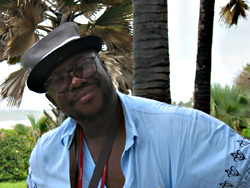Seattle Weekly: Ariwa Sounds, your label based in South London, has released over 200 albums. What year did it start?
Mad Professor: I started my recording studio in 1979 and the label started in March of 1981. The first single we put out was “Come Back Again” by a singer named Sgt. Pepper. My first dub release wasn’t until May 1982: Dub Me Crazy Part 1.
What made you start experimenting with dub?
I just felt it. I always had this idea to put together this dub album, this concept album. I developed the title Dub Me Crazy, and it turned into a 12-part series.
You make a lot of concept albums. Why?
An album should be like a trip, and it’s hard to complete a trip in one song. You don’t want people to listen to one track, or listen to half of one track and then skip through the next two and so on, but to keep them interested. In a trip, you go through different moods. My albums are a trip of emotions—two people in a room talking.
Dub is so meditative compared to traditional reggae; why do you think it has that effect?
Dub is a blank piece of canvas to help people think. It opens you up to create your own soundtrack to your life. The thing about music with words that perform melodies is that it’s already designed to take you somewhere, but sometimes that’s not quite where you want to go.
Your most recent LP, 2005’s Crazy Caribs, features popular dancehall riddims. Why do a dub CD of all dancehall riddims?
I thought I’d experiment, because most people who like dancehall don’t like dub and most people who like dub don’t like dancehall. I thought I’d appeal to both sides. But other people might say, “A wha dis?” [laughs]
Of all the records you’ve made, which one has gotten the most positive response?
The biggest seller has been [my] remixes [of] Massive Attack, No Protection, released in 1995 on Virgin.
How did that collaboration come about?
Massive Attack called me about doing a remix of “Sly” from their second album, Protection. I sent it back and they said, “Let’s give him some more stuff.”
You’ve done remixes for other well-known artists like Sade, Jamiroquai, and Rancid. How do you approach a remix as opposed to a dub?
A remix is your concept of a particular song—how you hear it in its new form. A dub could be something more skeletal. A remix could be a full song and a dub doesn’t have to be a song at all.
Mad Professor and the Ariwa Posse featuring Aisha play Chop Suey at 8 p.m. Wed., Jan. 25. $12 adv.





